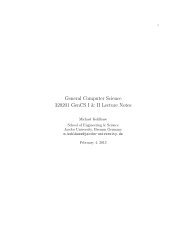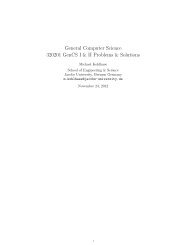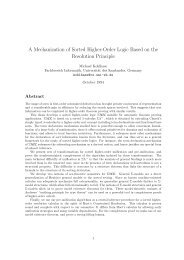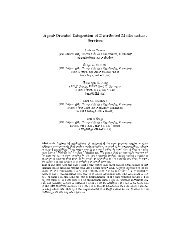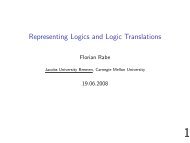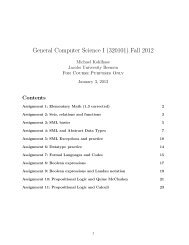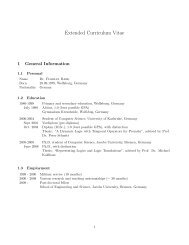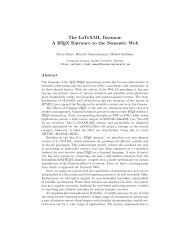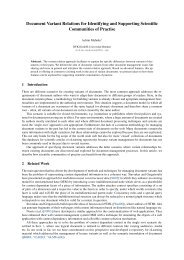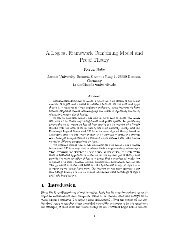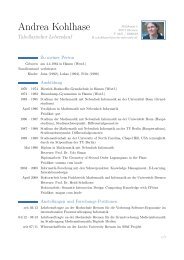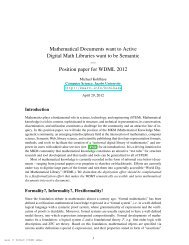- Page 1 and 2:
General Computer Science 320201 Gen
- Page 3 and 4:
Java programmer” on the practical
- Page 5 and 6:
Contents 1 Preface i 2 Representati
- Page 7 and 8:
4 Search and Declarative Computatio
- Page 9 and 10:
Fundamental Algorithms and Data str
- Page 11 and 12:
To earn an audit you have to take t
- Page 13 and 14:
i.e. to function as a member of the
- Page 15 and 16: a factor two in speed. This ability
- Page 17 and 18: “Applets, Not Craplets tm ” (-
- Page 19 and 20: c○: Michael Kohlhase 17 Can be re
- Page 21 and 22: Example 10 (Kruskal’s algorithm,
- Page 23 and 24: n 100n µs 7n 2 µs 2 n µs 1 100
- Page 25 and 26: 2.2 Elementary Discrete Math 2.2.1
- Page 27 and 28: Axiom 19 (P 1) “ ” (aka. “zer
- Page 29 and 30: Theorem 36 is a very useful fact to
- Page 31 and 32: Definition 43 The unary product ope
- Page 33 and 34: y stating element-hood (a ∈ S) or
- Page 35 and 36: Idea: We need a notion of “counti
- Page 37 and 38: Example 64 On sets of persons, the
- Page 39 and 40: Definition 82 We say that a set A i
- Page 41 and 42: clean enough to learn important con
- Page 43 and 44: Definition 90 anonymous variables (
- Page 45 and 46: c○: Michael Kohlhase 66 Defining
- Page 47 and 48: - fun both_plus (x:int,y:int) = fn
- Page 49 and 50: +(〈n, o〉) = n (base) and +(〈m
- Page 51 and 52: the axiom says that any object that
- Page 53 and 54: epresent them as a data type, where
- Page 55 and 56: Example 127 〈{N}, {[o: N], [s: N
- Page 57 and 58: The central idea here is what we ha
- Page 59 and 60: Substitutions Definition 149 Let A
- Page 61 and 62: Idea: Well-formed parts of construc
- Page 63 and 64: Other programming languages chose a
- Page 65: generally: fn+1 := fn + fn−1 plus
- Page 69 and 70: exception NaN; (* Not a Number *) f
- Page 71 and 72: Example 191 If A = {a, b, c}, then
- Page 73 and 74: Example 210 The Morse Code in the t
- Page 75 and 76: The first 32 characters are control
- Page 77 and 78: Idea: Unicode supports multiple enc
- Page 79 and 80: 2.5 Boolean Algebra We will now loo
- Page 81 and 82: What a mess! Iϕ((x1 + x2) + (x1
- Page 83 and 84: c○: Michael Kohlhase 140 The defi
- Page 85 and 86: (f ≤a g), iff there is an n0 ∈
- Page 87 and 88: P.1.2.3 then there are ei ∈ Ebool
- Page 89 and 90: 2.5.4 The Quine-McCluskey Algorithm
- Page 91 and 92: the disjunctive normal form, and th
- Page 93 and 94: Proof: by contradiction: let p /∈
- Page 95 and 96: So, the minimal polynomial of f is
- Page 97 and 98: 2.6 Propositional Logic 2.6.1 Boole
- Page 99 and 100: Idea: Import semantics from Boolean
- Page 101 and 102: which we can always do, since we ha
- Page 103 and 104: e quite difficult to establish in g
- Page 105 and 106: H 0 axioms are valid Lemma 316 The
- Page 107 and 108: c○: Michael Kohlhase 188 The enta
- Page 109 and 110: The deduction theorem and the entai
- Page 111 and 112: Inference with local hypotheses [A
- Page 113 and 114: 2.7 Machine-Oriented Calculi Now we
- Page 115 and 116: Thus the tableau procedure can be u
- Page 117 and 118:
A ∨ BT AT BT A ⇒ BT AF BT
- Page 119 and 120:
Proof: P.1 It is easy to see tahat
- Page 121 and 122:
(P ⇒ Q ⇒ R) ⇒ (P ⇒ Q) ⇒ P
- Page 123 and 124:
⎧ ⎪⎨ We represented the maze
- Page 125 and 126:
defined a directed graph to be a se
- Page 127 and 128:
Paths in Graphs Definition 373 Giv
- Page 129 and 130:
This allows us to view Boolean expr
- Page 131 and 132:
Computing with Combinational Circui
- Page 133 and 134:
Corollary 399 A fully balanced tree
- Page 135 and 136:
X 1 X 2 X 3 X n = if L i =X i if L
- Page 137 and 138:
3.2 Arithmetic Circuits 3.2.1 Basic
- Page 139 and 140:
S S ψ ψ −1 fS = ψ −1 ◦ fT
- Page 141 and 142:
The Full Adder Definition 415 The
- Page 143 and 144:
first summand 3 4 7 9 8 3 4 7 9 2 s
- Page 145 and 146:
c○: Michael Kohlhase 249 The anal
- Page 147 and 148:
Problems of Sign-Bit Systems Gener
- Page 149 and 150:
generate the n-bit binary number re
- Page 151 and 152:
and an + bn + (icn(a, b, c)) = 〈
- Page 153 and 154:
Summary: We have built a combinatio
- Page 155 and 156:
To understand the operation of the
- Page 157 and 158:
Example 443 (Address decoder logic
- Page 159 and 160:
3.4 Computing Devices and Programmi
- Page 161 and 162:
Our notion of time is in this const
- Page 163 and 164:
instructions LOADIN 1 and LOADIN 2
- Page 165 and 166:
Definition 457 An ASM program VM is
- Page 167 and 168:
instruction effect VPC peek i push
- Page 169 and 170:
c○: Michael Kohlhase 289 With the
- Page 171 and 172:
Imperative Stack Operations: peek l
- Page 173 and 174:
A SW program (see the next slide fo
- Page 175 and 176:
arguments to arithmetic operations
- Page 177 and 178:
µML, a very simple Functional Prog
- Page 179 and 180:
call pushes the return address (of
- Page 181 and 182:
[proc 2 26, con 0, arg 2, leq, cjp
- Page 183 and 184:
[proc 2 26, con 0, arg 2, leq, cjp
- Page 185 and 186:
eturn takes the current frame from
- Page 187 and 188:
label instruction effect comment
- Page 189 and 190:
Compiling µML Expressions (Continu
- Page 191 and 192:
c○: Michael Kohlhase 325 We want
- Page 193 and 194:
State Machine: 1 1,R 1 1,R 1 1,L 1
- Page 195 and 196:
The coded description acts as a pro
- Page 197 and 198:
the turing function uses will_halt
- Page 199 and 200:
Terabyte (T B) 1,000,000,000,000 by
- Page 201 and 202:
Layers in TCP/IP: TCP/IP uses encap
- Page 203 and 204:
name comment 4 version IPv4 or IPv6
- Page 205 and 206:
Domain names must be registered to
- Page 207 and 208:
That was almost all, but we close t
- Page 209 and 210:
c○: Michael Kohlhase 353 Note tha
- Page 211 and 212:
Definition 529 HTTP is used by a cl
- Page 213 and 214:
structure html,head, body metadata
- Page 215 and 216:
Server-Side Scripting: Programming
- Page 217 and 218:
c○: Michael Kohlhase 367 Indeed,
- Page 219 and 220:
presentation tools), but can also i
- Page 221 and 222:
1. reads web page 2. reports it hom
- Page 223 and 224:
Definition 570 Let A be a web page
- Page 225 and 226:
can combine both to falsify communi
- Page 227 and 228:
Candidates for one-way/trapdoor fun
- Page 229 and 230:
on a UNIX system, you can create a
- Page 231 and 232:
conceptually: transfer of directed
- Page 233 and 234:
Definition 591 The XML path languag
- Page 235 and 236:
Resources: Globally Identified by U
- Page 237 and 238:
R⌉}〉∫⊔⌉∇⌉⌈√⊣∇
- Page 239 and 240:
Problem solving Problem: Find algo
- Page 241 and 242:
Single-state Problem: Start in 5
- Page 243 and 244:
States integer locations of tiles A
- Page 245 and 246:
Implementation: States vs. nodes A
- Page 247 and 248:
Breadth-First Search c○: Michael
- Page 249 and 250:
Breadth-First Search: Romania c○:
- Page 251 and 252:
Note: Equivalent to breadth-first s
- Page 253 and 254:
A B C D E F G H I J K L M N O Depth
- Page 255 and 256:
A B C D E F G H I J K L M N O Depth
- Page 257 and 258:
Iterative deepening search Depth-l
- Page 259 and 260:
Breadth-first search Iterative deep
- Page 261 and 262:
Sibiu 253 Greedy Search: Romania Ar
- Page 263 and 264:
P.2 Let n be an unexpanded node on
- Page 265 and 266:
A ∗ search: Properties Complete Y
- Page 267 and 268:
Definition 618 (n-queens problem) P
- Page 269 and 270:
escape certain odd phenomena occurr
- Page 271 and 272:
GAs = evolution: e.g., real genes e
- Page 273 and 274:
Definition 632 A query is a list of
- Page 275 and 276:
(autoload ’run-prolog "prolog" "S
- Page 277 and 278:
Example 638 Computing the the n th
- Page 279 and 280:
Deduction: knowledge extension Abd
- Page 281 and 282:
[Koh06] Michael Kohlhase. OMDoc - A
- Page 283 and 284:
astarSearch search, 255 asymmetric-
- Page 285 and 286:
infinite, 32 counter program, 152,
- Page 287 and 288:
functional variable, 170 gate, 122
- Page 289 and 290:
media access control address, 194 M
- Page 291 and 292:
procedure abstract, 54 procedure de
- Page 293 and 294:
function, 30 spanning tree, 13 spro
- Page 295:
name, 70 variable functional, 170 v



